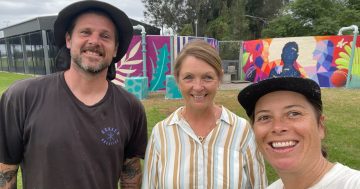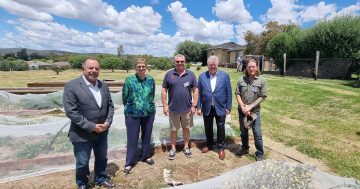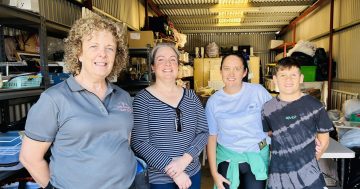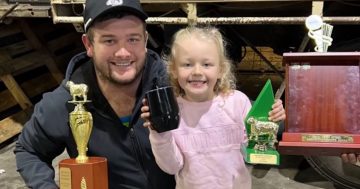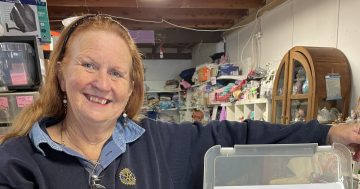
There is no right or wrong way to grieve, and it is different for everybody.
Editor’s note: The article below deals with sensitive subject matter that may distress some of our readers.
For the first holiday season after the suicide of her 14-year-old son, Oscar, in May 2017, Paula Franco-Mathewson of Bemboka felt she had to go through the motions with her family.
“I couldn’t get Christmas over with fast enough,” she says. “We had lunch then, quickly, dessert and presents. I felt like it wasn’t fair that I was ruining everyone else’s day but it’s also not fair that we’re expected to pretend that everything is normal when someone is missing.”
The shock and trauma of sudden death or a suicide leave everyone reeling, beginning with those closest and radiating out into the wider community.
So what can we do to help those who are bereaved, particularly over the festive period, a time when the social expectation of joy and togetherness can further isolate those who are grieving?
Program Manager at ACT Coronial Counselling Services, Fiona Loaney says that people supporting those who are grieving can often be unsure of what to do or say, so they may avoid contact with their grieving friend or family member, or not mention the person who has died so as not to upset them.
Ms Franco-Mathewson knows this response well and says she felt that for the first year after Oscar died, people were walking on eggshells.
“It’s OK if you want to talk to me about Oscar,” Ms Franco-Mathewson says.
She laughs ruefully and adds, “We’re already broken, you can’t break us any more.”
As Ms Franco-Mathewson recalls the hours after she and her husband found their son dead, she cries at the horror but also expresses gratitude for those who helped her in those darkest moments.
“We just asked for help,” she says. “First our neighbour Mick came in and then our local cop Dave came in. I was on the ground with Oscar in my arms and I saw Dave turn his head and I could tell he didn’t want to come in – but he did. He came and stayed with us. How do you ever say thank you for that? How do you apologise? Because it’s hard for the whole community.”
Nevertheless, it’s the community that must step up to support a grieving family and that’s just what Richard Newcombe did when he used takethemameal.com to set up meal rosters for two grieving Bega Valley families who had each recently experienced sudden death.

Takethemameal.com takes the hassle out of making a meal roster for someone in need. “The hardest part of a meal roster is the organisation,” says Richard Newcombe, who has recently used the website to support two Bega Valley families.
Mr Newcombe explains that he lost his best mate to suicide in 2004, a man with four children and a partner left behind.
“I’ve been in that place, it’s totally overwhelming,” Mr Newcombe says of grief. “Getting out of bed is hard enough, let alone feeding a family.”
Knowing that “there’s so little we can do or say when someone dies suddenly or violently,” Mr Newcombe fell upon a practical solution and has been amazed to watch the community leap in to ensure the bereaved families are well-fed and that they know there is “a solid crew of people who love them”.
“It’s hard to accept that kind of help, we’re so well-trained not to be a burden,” Mr Newcombe says, “but none of us are immune to life’s curveballs. It’s good to know that when those curveballs come, our communities are there for us.”
In the time after Oscar died, Ms Franco-Mathewson remembers the little things her community did to help. “The fellow across the street brought a rose,” she says. “You don’t have to say anything, you don’t have to feel sorry for us but any genuine gesture is appreciated.”

“If you don’t have the sadness, you don’t recognise the beautiful things as much,” says Ms Franco-Mathewson.
Likewise, she welcomes genuine empathetic shows of emotion. “Empathy is a beautiful thing,” she says, “and maybe if we practise it more, suicide will be a thing of the past.
“People are scared of the emotion,” Franco-Mathewson adds, wiping tears from her face. “When I talk about Oscar, I cry. I spend a lot of time holding it together, but when I drive past the cemetery, I howl.”
Ms Loaney advises not to “tell a grieving person that they need to be strong, either for themselves or someone else. A better message is letting people know it is OK to express their feelings and take a break if they need one.”
This festive season, Ms Franco-Mathewson took the pressure off, with the family able to treat Christmas the same as any other day if they wanted, simply staying afloat and remembering their beloved son and brother Oscar.
ACT Coronial Counselling Services provides free help and support to anyone affected by a death being investigated by the ACT Coroner’s Court.
If you or someone you know is suicidal, please call Lifeline on 13 11 14.







